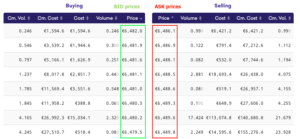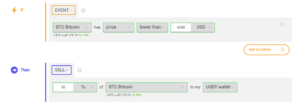Category
- Trading Strategies
- Get Started
- Exchanges Guidelines
- Trading Tips
Crypto Trading Jargon Explained
It’s time now to explain some of those confusing terms you will encounter while using crypto tools, trading on crypto exchanges or reading crypto news.
Crypto exchanges are online sites where users buy and sell cryptocurrencies between each other. Within an exchange, the orders of the traders set the price. In some other cases, you will buy or sell cryptocurrencies while having a company, not an individual, as your direct counterpart. That will usually mean higher fees. To make this more clear, when you log in to, for example, Coinbase or Bitpanda, you trade crypto at a price set by the exchanges (of course generally aligned to the general market conditions). Instead, if you use Coinbase Pro or Bitpanda Global Exchange, the exchanges will match your orders with those from other market participants.
Each exchange receives all the buy and sell orders on a specific trading pair and arranges them by price and timestamp into an order book, which constitutes the market for each trader on that exchange. The buy orders are called bids since traders are placing a “bid” to buy a certain cryptocurrency. On the other hand, the sell orders are named asks because this is the price that a trader “asks” to sell at. To avoid confusion, when we generally refer to the “price” of a cryptocurrency, we are not talking either about the bid or the ask price, but about the last traded price.
It’s important to underline this concept because there isn’t a unique official price for each cryptocurrency but there is a last traded price for each exchange. Therefore every cryptocurrency has as many prices as exchanges list that coin. These price differences are a result of the fragmented nature of the crypto market. It’s not unusual to see significant price differences between different countries. Developing regions like Latin-America or South-East Asia are typical examples. There the price usually differs from exchanges in developed countries.
Another relevant term crypto traders should be accustomed to every day is volume. It stands for the amount of traded cryptocurrencies in a given period of time. Large trading volumes usually accompany strong trends. For instance, high volumes generally accompany a healthy upward trend. When the price rises with low volumes, that could signal that a reversal will come soon.
The best order for each strategy
Depending on the trading strategy you want to pursue, you can send different orders. There are three types of orders. A market order refers to an order that will be instantly filled at the current market conditions. So if you send a market order to buy 1 Ethereum, your order will be executed at the cheapest ask price quoted at that moment on the order book. Depending on the size of your order in relation to the current available-to-sell coins, you might end up buying at a higher price than expected. That means that using market orders, you may pay more than you intended.
Use this order when you want the order to be executed as soon as possible.
To avoid this, you may be better off using a limit order. Setting up a maximum price you are willing to pay when buying (or minimum price you demand to receive if selling) you have the warranty of not trading at undesired prices. On the other hand, you may need to wait for the market conditions to satisfy your request. Of course, the lower your limit price will be than the ask price (in case of buy orders), the lower the chances that you will have your order filled.
Use this order when you want to execute your order at a specific price. If the conditions are not met, you don’t want to trade.
A third, more advanced, type of order is the stop-loss order that lets you set a specific price at which you want to sell in the future, in case the price dramatically drops. This type of order helps minimize losses, and I suggest always to add it to your trading strategies. When you set a stop-order, you are giving to the exchange the following instruction: “If the price drops by X per cent, I will sell my coins.” Does it sound familiar?
A stop-loss perfectly fits the If-This-Then-That logic of the trading strategies that you can build with Coinrule. Setting up a stop-loss has never been easier than with Coinrule.
Use this order when you want to protect yourself from significant and undesired losses.
Crypto trading jargon guide
Now that you know the basics of placing an order, you are ready to start trading cryptocurrencies. As a newbie in the crypto space, more advanced traders will consider you a noob. Here is a brief list of things you should avoid doing as a noob:
- Beware of shills. Shilling is a common activity of promoting projects and rules for personal purposes. You will read of ‘excellent’ and ‘promising’ projects that are in reality backed by nothing other than hot air. Always DYOR: ‘do your own research’ before buying a coin.
- Every time you witness a sharp price increase, think twice before jumping into the trade. Pump-and-dump is the favorite practice of large traders (also known as whales) that push the price higher to trap retail traders before dumping it soon after. Significant price increases make less experienced traders believe they will miss huge profit opportunities if they don’t buy. This feeling is generally defined as fear-of-missing-out (FOMO) and is one of the biggest threats while trading cryptocurrencies.
- Don’t believe everything you read about cryptocurrencies. Fake news is everywhere. Sometimes they target specific people, companies or projects, other times they try to cast a shadow of fear, uncertainty and doubt (FUD) on the industry as a whole. Always double-check the source and reliability of the news to avoid FUD.
- Don’t get rekt! Before making money, you need to preserve your capital. If your losses erode all your investment allocation, you will be rekt. You will lose the opportunity to keep trading in the long term, missing the great opportunities that crypto trading offers!
You are now ready to start trading crypto!
Before you send out your first order, we have a few more pieces of advice for you.


